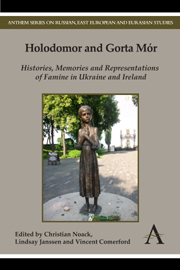Book contents
- Frontmatter
- Contents
- List of Figures
- Acknowledgements
- Introduction Holodomor and Gorta Mór: Histories, Memories and Representations of Famine in Ukraine and Ireland
- Part I Histories, Historiography and Politics
- Part II Public Commemoration
- Part III Trauma and Victimisation
- Part IV New Sources and New Approaches to the Irish and Ukrainian Famines
- Index
Introduction Holodomor and Gorta Mór: Histories, Memories and Representations of Famine in Ukraine and Ireland
Published online by Cambridge University Press: 05 May 2013
- Frontmatter
- Contents
- List of Figures
- Acknowledgements
- Introduction Holodomor and Gorta Mór: Histories, Memories and Representations of Famine in Ukraine and Ireland
- Part I Histories, Historiography and Politics
- Part II Public Commemoration
- Part III Trauma and Victimisation
- Part IV New Sources and New Approaches to the Irish and Ukrainian Famines
- Index
Summary
Introduction
On 17 April 2012, in the bilingual Ukrainian Week, Hennadiy Kazakevych reminded his readers that, 90 years earlier, Ireland had gained its independence from the British Empire, while simultaneously the hopes of militant Ukrainian nationalists were crushed by the Bolsheviks emerging victoriously from the Russian Civil War. Whatever the historical accuracy of this piece, historians of empire have so far paid surprisingly little attention to the many parallels between the histories of Ireland and Ukraine, then provinces of crucial importance for both powers.
An obvious similarity, it would seem, is the centrality of two famines for the development of modern Ireland and modern Ukraine. The traumatic nature of these events has led these peoples, in the words of Kai Erikson, ‘to feel estranged from the rest of humanity’ and consequently to see their cultural group as somehow distinctive. This combined with the predominance of the national history paradigm leads more often than not to exclusive treatments of both tragedies, usually with an emphasis on the uniqueness of sufferings incurred either by the Irish or by the Ukrainian people. Comparative research on the Great Famine and the Holodomor has so far been attempted mainly in the realm of economic history and principally in the context of global enquiry into the occurrence of famines across time and space.
- Type
- Chapter
- Information
- Holodomor and Gorta MórHistories, Memories and Representations of Famine in Ukraine and Ireland, pp. 1 - 16Publisher: Anthem PressPrint publication year: 2012



